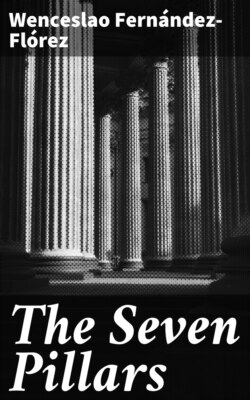Читать книгу The Seven Pillars - Wenceslao Fernández-Flórez - Страница 3
На сайте Литреса книга снята с продажи.
INTRODUCTORY NOTE
ОглавлениеTable of Contents
Spain is occupied with a revaluation of its values. A novel that gained the National Prize for Literature and was a “best seller” last year, must tell something of what Spanish readers and writers are thinking. W. Fernández Flórez, a native of Galicia, has written a number of novels, a volume on the Theatre, and a volume of Parliamentary Sketches, but so far as I know Las Siete Columnas is his first conspicuous success, although Las Gafas del Diablo, published a few years ago, went into several editions. I have translated the title as The Seven Pillars, the supports, let us say, of modern Civilisation. They are our old friends, the Seven Deadly Sins. Part One is an ironic description of modern life, but the irony has neither the suavity of Anatole France nor the bitter pathology of Octave Mirbeau. It is life seen through the hard and positive eyes of a Spaniard, and even the humour is grim. In Part Two the Seven Deadly Sins have been removed; the Seven Pillars have fallen, and with their fall, civilisation collapses.
The Devil is the Destroyer. You may think his temptation of the Hermit, as described in the Prologue, an incompetent effort, but if you be pleased to read, in Chapter Seven, of the fashion in which he granted the Holy Man his terms, you may agree that the Devil was the Devil.
I am not learned in Castilian, and, indeed, set myself the task of translation as a relief from work, and to better my knowledge. There may be slips due to carelessness or to ignorance, but I give you my word that the English is a faithful rendering, and not a paraphrase of the original. I have tried to keep the exotic flavour, but to avoid the easy device of retaining un-English forms of construction.
P. CHALMERS MITCHELL
Whipsnade,
January 1, 1934
